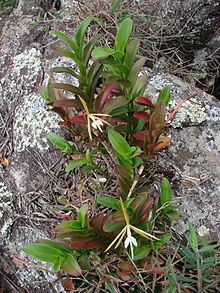Epidendrum
| Epidendrum | |
|---|---|
 |
|
| E. nocturnum | |
| Scientific classification | |
| Kingdom: | Plantae |
| (unranked): | Angiosperms |
| (unranked): | Monocots |
| Order: | Asparagales |
| Family: | Orchidaceae |
| Subfamily: | Epidendroideae |
| Tribe: | Epidendreae |
| Subtribe: | Laeliinae |
| Alliance: | Epidendrum |
| Genus: |
Epidendrum L., 1763 |
| Type species | |
|
Epidendrum nocturnum Jacq., 1760 |
|
| Species | |
|
About 1,100 species—see List of Epidendrum species |
|
About 1,100 species—see List of Epidendrum species
Epidendrum /ˌɛpᵻˈdɛndrəm/, abbreviated Epi in the horticultural trade, is a large neotropical genus of the orchid family. With more than 1,500 species, some authors describe it as a mega-genus. The genus name (from Greek ɛpɨ, epi and δένδρον, dendron, "upon trees") refers to its epiphytic growth habit.
When Carl Linnaeus named this genus in 1763, he included in this genus all the epiphytic orchids known to him. Although few of these orchids are still included in the genus Epidendrum, some species of Epidendrum are nevertheless not epiphytic.
They are native to the tropics and subtropical regions of the American continents, from North Carolina to Argentina. Their habitat can be epiphytic, terrestrial (such as E. fulgens), or even lithophytic (growing on bare rock, such as E. calanthm and E. saxatile). Many are grown in the Andes, at altitudes between 1,000 and 3,000 m. Their habitats include humid jungles, dry tropical forests, sunny grassy slopes, cool cloud forests, and sandy barrier islands.
...
Wikipedia
